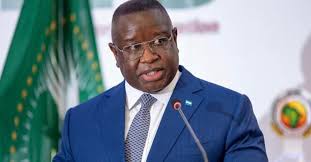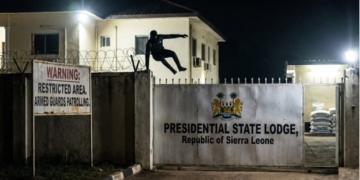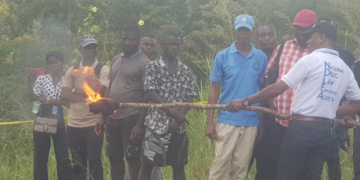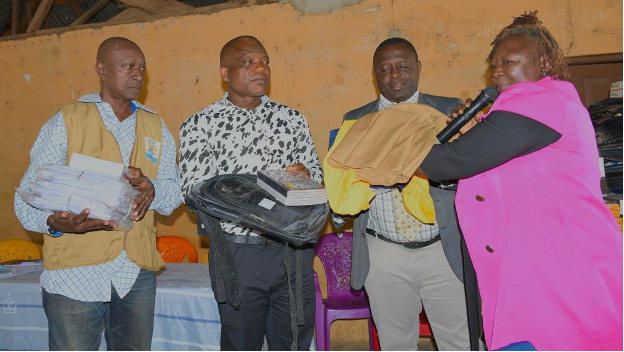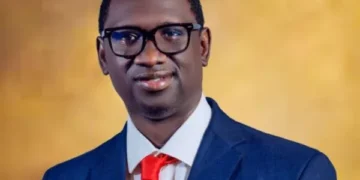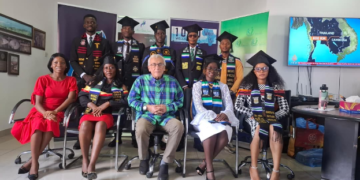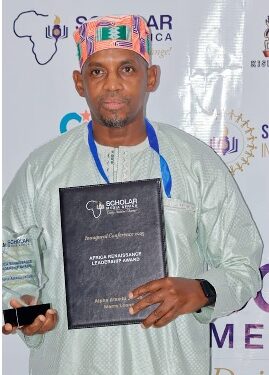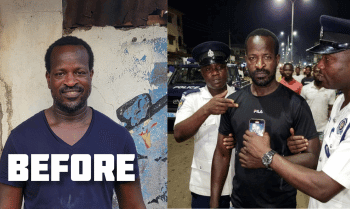By Alpha Amadu Jalloh (picture)
Author of “Monopoly of Happiness: Unveiling Sierra Leone’s Social Imbalance”
Africa Renaissance Leadership Award Recipient, 2025.
In any democracy, institutions like the Electoral Commission for Sierra Leone (ECSL) and the Political Parties Regulation Commission (PPRC) are expected to function as the custodians of trust, fairness, and national unity. But in Sierra Leone, these bodies have become dangerously compromised, trapped in political favoritism, internal power struggles, and decades of unaccountable entrenchment. What was meant to be a framework for democratic order is now a machinery for confusion, manipulation, and regional division.
The looming battle to replace ECSL Chief Mohamed Konneh reveals a deeper crisis. After overseeing one of the most controversial elections in recent history, Konneh is facing mounting pressure to resign. Yet, what should have been a transparent succession process has devolved into a murky, tribalized power play.
Regional heads within ECSL are at war with each other, not over reform or institutional credibility, but over control, loyalty, and political leverage.
Now enters Zainab Umu Moseray, currently a key figure at the PPRC and, reportedly, a close ally of President Julius Maada Bio. Her meteoric rise and partisan actions at the commission have raised alarm bells across the political spectrum. Under her watch, the PPRC has increasingly operated as a weapon against opposition parties, issuing selective sanctions while turning a blind eye to repeated violations by the ruling Sierra Leone People’s Party (SLPP).
The perception that both ECSL and PPRC are serving as appendages of the executive branch is no longer just a theory, it is a lived reality. And that reality is eroding public confidence, breeding political tension, and threatening the legitimacy of future elections, especially in 2028. When institutions that should embody national unity begin to reflect partisan agendas, civil unrest becomes not just possible, it becomes inevitable.
Both commissions are structurally broken. The ECSL, for example, is filled with long-serving staff, some of whom have been in the system for over thirty years. This is not a sign of experience, it’s a symptom of stagnation. Many of these officials have outlived political regimes and grown more loyal to power networks than to the Constitution.
Reforming the ECSL means clearing out this entrenched bureaucracy and opening the doors to fresh, competent, and nationally representative leadership.
But personnel change alone is not enough. We need to rethink how these institutions are governed.
Currently, the president nominates and parliament confirms commissioners, a process easily manipulated by ruling parties with parliamentary majorities. That must change.
Commissioners, both at the national and regional levels, must be chosen through consensus among all registered political parties, civil society, and professional associations. The integrity of elections cannot be left in the hands of presidential appointees.
What’s equally worrying is the bitter infighting within both ECSL and PPRC structures. Internal sources speak of clashes between regional ECSL offices and headquarters, where tribal and political loyalties trump professionalism.
Proposals for transparency are blocked, whistleblowers are silenced, and critical voter education and data systems are routinely sabotaged by power struggles. These fractures, if left unaddressed, will explode during the next election cycle.
Zainab Moseray’s role in all of this is pivotal. Her alleged closeness to State House, coupled with her increasingly partisan posture at the PPRC, raises questions not just about bias, but about the future of political pluralism in Sierra Leone.
The PPRC was created to protect the rights of all political parties, not to protect the ruling party from scrutiny. Her continued presence at the helm undermines the Commission’s credibility and violates the spirit of impartial governance.
If the trend continues, we will walk into the next general election with two broken institutions presiding over a broken system. The result will not be democracy, it will be disorder. Sierra Leoneans have not forgotten the lessons of war.
The Truth and Reconciliation Commission made it clear: marginalization, corruption, and exclusion were the seeds of our national tragedy. We are now dangerously close to planting those seeds again.
A reformed electoral and political regulatory system must reflect the full diversity of Sierra Leone, ethnically, regionally, politically, and professionally. We must stop building institutions around individuals, and instead build them around principles.
The ECSL and PPRC cannot be tools of convenience for those in power; they must be bulwarks of integrity for all Sierra Leoneans.
This dissolution is not a luxury; it’s a necessity. If we are to preserve peace, foster national unity, and build a future that is just and democratic, then we must dismantle these institutions as they currently exist and rebuild them from the ground up, starting now.
The time to act is not during elections. It is before. The credibility of 2028, and the very idea of democracy in Sierra Leone, depends on what we do today.


